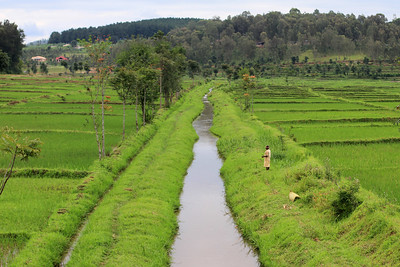This digest has been re-branded to What to Read in April 2022.
As every year, the month of March has been packed with content and events around the globe related to women's land rights. The Land Portal Foundation, which has been working on the land and gender nexus for many years, took this opportunity to relaunch its thematic Land and Gender portfolio and hold a webinar on the risks to informal spouses from land tenure formalization and titling campaigns. Both inspired this digest, and I decided to investigate the issue of intersectional vulnerabilities for women, who are often overlooked in formalization campaigns, a little more deeply.
While land rights formalization and (joint) titling campaigns have significantly contributed to increasing tenure security in many parts of the world, some vulnerable groups have been left out systematically. This includes women in informal de-facto marriages or subsequent women in polygamous settings, for example. The Global Land Alliance study Invisible And Excluded: Risks To Informal Wives And Partners From Land Tenure Formalization And Titling Campaigns In Latin America raises this under-explored, important issue and provides a great starting point.
In this digest, I cast my net a bit wider and look into case studies from Sub-Saharan Africa, notably Ethiopia and Rwanda. The digest closes with a thorough comparative study that offers a differentiated take on rural women and female access to land in Ghana, Nigeria, and Zimbabwe. It’s a selection particularly helpful to those working on and researching women’s land rights and land titling projects.
Sign up here to receive this digest in your mailbox
The Rights of Women in de facto Unions to Land and Property in Rwanda
By Kaiser Hughes, Ailey Madina Ndangiza, and Mireille Ikirezi
 Drawing the attention to women’s experiences and rights to land of women living in de-facto unions in Rwanda, this publication explores root causes and the legal context of informal unions in Rwanda. Closing, the authors provide recommendations for strengthening the rights of informally married women to land and natural resources. Methodologically, the policy paper draws on focus groups discussions, key informant interviews, and a court case analysis.
Drawing the attention to women’s experiences and rights to land of women living in de-facto unions in Rwanda, this publication explores root causes and the legal context of informal unions in Rwanda. Closing, the authors provide recommendations for strengthening the rights of informally married women to land and natural resources. Methodologically, the policy paper draws on focus groups discussions, key informant interviews, and a court case analysis.
Rwanda’s legal framework provides only little protection to women’s land claims in de-facto unions who are illegitimate by law. The authors outline in detail under which conditions the different kinds of de-facto unions – monogamous unions in which bride wealth has been paid, consensual cohabitation, concubine unions, and polygamous (religious) marriages – may be socially respected and considered legitimate. Children add legitimacy to an informal union and strengthen the women’s position.
The findings also show that women in de-facto unions have no right of refusal over land transfers or marital property in case of separation or widowhood. Women may gain access to land through their children, if they are officially recognized by their fathers. It seems only women with own property benefit from entering a de-facto union as they do not need to share her property in case of divorce. However, the majority of women in de-facto unions are economically dependent and face multiple social, health, political, and economic constraints. Quite right, Hughes et al. call for further research to get a better - and more differentiated – understanding of the situation of and the consequences of land titling for informal wives.
Photo credit: Women in Rice Paddies, Rwanda, photo by Adam Cohn, 2011, CC BY-NC-ND 2.0 license
The Gender Implications of Joint Land Titling in Ethiopia
By Hirut Girma and Renée Giovarelli
 This brief offers a critical take on joint titling initiatives in southern Ethiopia. The authors focus less on women in informal marriages, but they consider rural women as a heterogenous group and differentiate accordingly in their analysis. After providing a short history of women’s land rights in Ethiopia, the authors outline the legal context before presenting their findings on the implications of joint titling for women.
This brief offers a critical take on joint titling initiatives in southern Ethiopia. The authors focus less on women in informal marriages, but they consider rural women as a heterogenous group and differentiate accordingly in their analysis. After providing a short history of women’s land rights in Ethiopia, the authors outline the legal context before presenting their findings on the implications of joint titling for women.
In the interest of this digest, I want to highlight the results regarding the implications of joint titling for women in polygamous unions. While polygamy is not permitted by law in Ethiopia, customary practices have prevailed with laws differing between regions. Before 1995, only the male household head would register land leaving subsequent wives excluded and without rights to land. Since the 1995 Constitution, the authors found that in the southern SNNP region land titles were initially to be issued to the head of household and the first wife with all subsequent wives receiving certificates in their own names. This was meet by resistance from polygamous men and was eventually altered in ways that strengthen the men’s position.
In other regions, such as Oromia, all wives are registered on a single certificate, excluding future wives from their right to land. Nonetheless, the authors show an increased tenure security perception of husbands and wives in polygamous households. Particularly, subsequent wives perceive a greater increase in tenure security as compared to earlier titling policies and practices which usually strengthened the position of first wives. Also, it seems the visibility of the wives’ names on titling and registration certificates heightens the public expectation of (rather) equal shares of land upon divorce or death of a spouse.
Closing, Hirut Girma et al. strongly recommend addressing the issues related to land formalization and registration in the context of polygamous marriages. This is ever more important in times of rising land scarcity and the impact of climate change in southern Ethiopia. Although this preliminary study does not fully differentiate the gendered impact of joint land titling it provides valuable first insights into the various challenges which may be experienced similarly in other regions or countries.
Photo credit: Dareshe Women in Ethiopia, photo by Rod Waddington, 2018, CC BY-SA 2.0 license
Differentiations in Women’s Land Tenure Experiences: Implications for Women’s Land Access and Tenure Security in Sub-Saharan Africa
By Uchendu Eugene Chigbu, Gaynor Paradza, Walter Dachaga
 This last piece offers an in-depth and much needed differentiated analysis of rural women’s tenure experiences. In sharp contrast to most writings and land rights campaigns, the authors show how important it is to look beyond simplified gender images, in which men and even more so women are seen as homogenous groups. Although the publication takes a broader approach, its findings are key to better understand the challenges of invisible and excluded women in formalization campaigns.
This last piece offers an in-depth and much needed differentiated analysis of rural women’s tenure experiences. In sharp contrast to most writings and land rights campaigns, the authors show how important it is to look beyond simplified gender images, in which men and even more so women are seen as homogenous groups. Although the publication takes a broader approach, its findings are key to better understand the challenges of invisible and excluded women in formalization campaigns.
Chigbu et al. analyze how the different statuses, needs, and challenges of women in rural Nigeria, Ghana, and Zimbabwe shape their access to land. The comparative study brings to the fore in which ways female membership in diverse cultural, ethnic, religious, and economic groups as much as their marital status affect women’s tenure security. The authors develop a matrix of the various factors and provide a visualization of women’s differentiation presenting potential entry points for actions.
What is more, Chigbu et al. not only show that laws and policies in the case study countries failed to address women’s land rights from a heterogeneity perspective but present an adaptable approach for mainstreaming differentiation among women in land tenure policies and interventions. This offers a starting point to specifically include the specific needs and challenges women face in informal marriages or subsequent women in polygamous contexts in the future.
Photo credit: Women’s Leadership Forum, photo by US Africa Command, 2017, CC BY-NC 2.0 license



